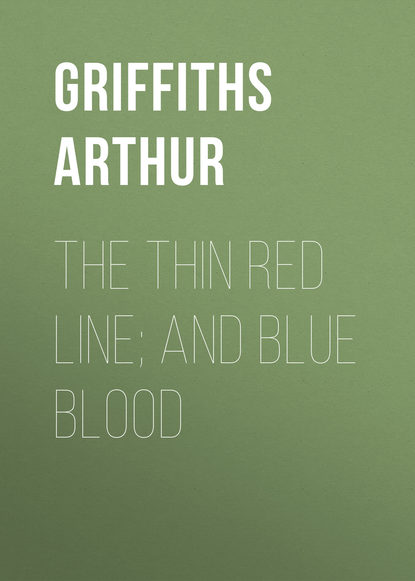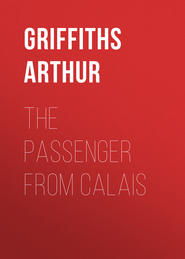По всем вопросам обращайтесь на: info@litportal.ru
(©) 2003-2024.
✖
The Thin Red Line; and Blue Blood
Настройки чтения
Размер шрифта
Высота строк
Поля
"I am the Countess de Saint Clair," replied Madame Cyprienne, proudly; "but I do not assume the title now. I do not choose it to be known that I live by singing, and by selling the remnants of our family lace."
"I hope Lady Essendine paid you a decent price," said the colonel, pleasantly.
Madame Cyprienne shook her head, with a little laugh—
"She has been very kind—exceedingly kind—but she knows how to drive a bargain: all women do."
"What a shame! And have you sold it all? You had better entrust me with the disposal of the rest."
"Oh! Colonel Wilders, I could not think of giving you so much trouble."
"But I will; I should like to. Send it to me. My chambers are in Ryder Street; or, better still, I will call for it if you will tell me where," said the colonel, artfully.
"I am lodging in a very poor place, not at all such as the Countess de Saint Clair should receive in. But I am not ashamed of it; it is in Frith Street, Soho, No. 29a; but I do not think you ought to come there."
"A most delightful part of the town," said the colonel, who at the moment would have approved of Whitechapel or the New Cut. "When shall I call?"
"In the afternoon. In the morning I am engaged in giving lessons. But come, we have lingered here long enough. Miladi will expect me to sing again."
Lady Essendine frowned at Cousin Bill when he brought back her singer; but whether it was at the length of the talk, or the withdrawal of her protégée from the duties for which she was paid, her ladyship did not condescend to explain. It was a little of both. She was pleased to have hindered her son from paying marked attention to a person in Madame Cyprienne's doubtful position. Now she found that person exercising her fascinations upon Colonel Wilders, and it annoyed her, although Cousin Bill was surely old enough to take care of himself. Already she was changing her opinion concerning the fair singer she had introduced into the London world. She could not fail to notice the admiration Madame Cyprienne generally received, especially from the men, and she doubted whether she had done wisely in taking her by the hand.
A few days later she had no doubt at all. To her disgust, all the old Spanish point-lace was gone; and Madame Cyprienne had told her plainly that it was her own fault for haggling over the price. Her ladyship's disgust was heightened when she found the best piece of all—a magnificent white mantilla—in the possession of a rival leader of fashion, who refused to say where she had got it, or how.
She set her emissaries at work, however—for every great London lady has a dozen devoted, unpaid attachés, ready to do any little commission of this kind—and the lace was traced back to Colonel Wilders.
"My dear," she said, one morning, to her lord, "I am afraid Colonel Wilders is very intimate with that Madame Cyprienne."
"Our eccentric Cousin Bill! You don't say so? Well, there's no fool like an old fool," said Lord Essendine, who was a very matter-of-fact, plain-spoken peer.
"I always thought she was an adventuress," cried Lady Essendine, angrily.
"Then why did you take her up so hotly? But for you, no one would ever have heard of the woman, least of all Cousin Bill."
"Well, I have done with her now. I shall drop her."
"The mischief's done. Unless I am much mistaken, she won't drop Cousin Bill."
Lord Essendine, who was, perhaps, behind the scenes, was not wrong in his estimate of the influence Madame Cyprienne exercised. Before six months were out, Colonel Wilders came, with rather a sheepish air, to the head of the house, and informed him of his approaching marriage to the Countess de Saint Clair.
"That's a new title to me, Bill. Foreign, I suppose?" Lord Essendine had the usual contempt of the respectable Briton for titles not mentioned in Debrett or Burke.
"It's French, I fancy; and for the moment it is in abeyance. Madame Cyprienne tells me—"
"Gracious powers, William Wilders! have you fallen into that woman's clutches?"
"I must ask you, Lord Essendine, to speak more respectfully of the lady I propose to make my wife."
"You had better not! I warn you while there is yet time."
"What do you know against her?" asked the colonel, hotly.
"What do you know of or for her?" replied the peer, quickly. "I tell you, man, it's a disgrace to the family. Lady Essendine will be furious. If I had any authority over you I would forbid the marriage. In any case," he went on, "do not look for any countenance or support from me."
"I hope we shall be able to get on without your assistance, Lord Essendine. I thought it my duty to inform you of my marriage, and I think I might have been better received."
"Stay, you idiot; don't go off in a huff. I don't like the match, I tell you frankly; but I don't want to quarrel. Is there anything I can do for you, except attending the wedding? I won't do that."
Colonel Wilders could not bring himself to ask any favours of his unsympathetic kinsman. Nevertheless, it was through Lord Essendine's interest that he obtained a snug staff appointment in one of the large garrison towns; and he did not return indignantly the very handsome cheque paid in by his cousin to his account as a wedding present.
He was still serving at Chatsmouth, his young and beautiful wife the life of the gay garrison, when the war-clouds gathered dark upon the horizon, and, thanks again to the Essendine interest, he found himself transferred, still on the staff, to the expeditionary army under orders for the East.
CHAPTER V.
THE WAR FEVER
They were stirring times, those early days of '54. After half a century of peace the shadow of a great contest loomed dark and near. The whole British nation, sick and tired of Russian double-dealing, was eager to cut the knot of political difficulty with the sword. Everyone was mad to fight; only a few optimists, statesmen mostly, still relying on the sedative processes of diplomacy, had any hopes of averting war. A race reputed peace-loving, but most pugnacious when roused, was stirred now to its very depths. British hearts beat high throughout the length and breadth of the land, proudly mindful of their former prowess and manfully hopeful of emulating former glorious deeds.
It was the same wherever Englishmen gathered under the old flag; in every corner of the world peopled by offshoots from the old stock, most of all in those strongholds and dependencies beyond sea captured in the old wars, and still held by our arms.
It was so upon the great Rock, the commonly counted impregnable fortress, one of the ancient pillars of Hercules that still stands silently strong and watchful at the mouth of the Mediterranean Sea.
Nowhere did the war fever rage higher than at Gibraltar. Before everything, a garrison town, battlemented and fortified on every side, resonant from morning gunfire till watch-setting with martial sounds, its principal pageants military, with soldiers filling its streets, and sentinels at every corner, the prospect of active service was naturally the one theme and topic of the place.
As spring advanced, one of those balmy-scented Southern springs when flowers highly prized with us blossomed wild everywhere, even in the fissures of the rock—when the days are already long and bright, under ever-blue and cloudless skies, Gibraltar realised more fully that war was close at hand. Lying in the high road to the East, it saw daily the armed strength of England sweep proudly by. Now a squadron of men-of-war: not the hideous, shapeless ironclad of to-day, but the traditional three-decker, with its tiers of snarling teeth and its beauty of white-bellying canvas and majestic spar. Now a troopship with its consorts, two, or three, or more, tightly packed with their living cargo—whole regiments of red-coated soldiers on their way to Malta and beyond.
Such sights as these kept the garrison—friends and comrades of those bound eastward—in a state of constant high-pitched excitement. At first, forbidden by strict quarantine, there was no communication between the sea and the shore, but all day long there were crowds of idlers ready to line the sea-wall and greet every ship that came in close enough with hearty repeated cheers. When the vexatious health-rules were relaxed, and troopships landed some of their passengers, there was endless fraternisation, eager discussion of coming operations, and unlimited denunciation of the common foe.
Members of the garrison itself were, of course, frantically jealous of all who had the better luck to belong to the expeditionary force. That they were not under orders for the East was the daily burden of complaint in every barrack-room and guard-house upon the Rock. The British soldier is an inveterate grumbler; he quarrels perpetually with his quarters, his food, his clothing, and his general want of luck. Just now the bad luck of being refused a share in an arduous campaign, with its attendant chances of hardships, sufferings, perhaps a violent death, made every soldier condemned to remain in safety at Gibraltar discontented and sore at heart.
"No orders for us by the last mail, Hyde," said a young sergeant of the Royal Picts, as he walked briskly up to the entrance of the Waterport Guard.
A tall, well-grown, clean-limbed young fellow of twenty-four or five: one who prided himself on being a smart soldier, and fully deserved the name. He was admirably turned out; his coatee with wings, showing that he belonged to one of the flank companies, fitted him to perfection; the pale blue trousers, the hideous fashion of the day, for which Prince Albert was said to be responsible, were carefully cut; his white belts were beautifully pipe-clayed, and the use of pipe-clay was at that time an art; you could see your face in the polish of his boots. A smart soldier, and as fine-looking a young fellow as wore the Queen's uniform in 1854. He had an open, honest face, handsome withal; clear bright grey eyes, broad forehead, and a firm mouth and chin.
"Worrying yourself, as usual, for permission to have your throat cut. Can't you bide your time, Sergeant McKay?"
The answer came from another sergeant of the same regiment, an elder, sterner man—a veteran evidently, for he wore two medals for Indian campaigns, and his bronzed, weather-beaten face showed that he had seen service in many climes. As a soldier he was in no wise inferior to his comrade: his uniform and appointments were as clean and correct, but he lacked the extra polish—the military dandyism, so to speak—of the younger man.
"War is our regular trade. Isn't it natural we should want to be at it?" said Sergeant McKay.
"You talk like a youngster who doesn't know what it's like," replied Sergeant Hyde. "I've seen something of campaigning, and it's rough work at the best, even in India, where soldiers are as well off as officers here."
"Officers!" said McKay, rather bitterly. "They have the best of it everywhere."
"Hush! don't be an insubordinate young idiot," interposed his comrade, hastily. "Here come two of them."
The sergeants sprang hastily to their feet, and, standing strictly to attention, saluted their superiors in proper military form.
"That's what I hate," went on McKay.








